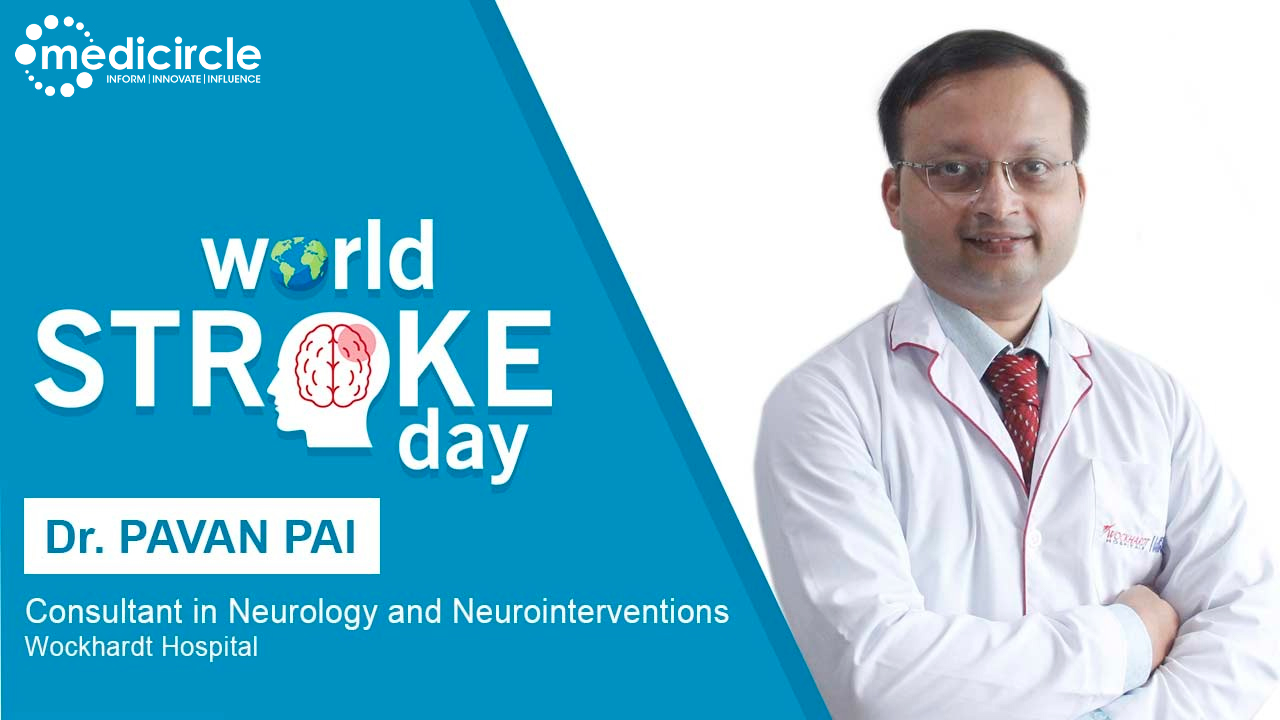The brain is an extremely complex organ that controls various body functions. If a stroke occurs and blood flow can't reach the region that controls a particular body function, that part of the body won't work as it should. A stroke occurs when a vein in the brain bursts and bleeding occurs or a blood clot forms or when there is a blockage in the blood supply to the brain. Stroke is one of the leading causes of death and disability in India. The incidence of stroke in India has increased by 100% in the past few decades. Stroke incidence in India is higher (194-215 per 100,000 population) in rural areas as compared to the national average (119-145 per 100,000 population).
World Stroke Day is observed on October 29 to underscore the serious nature and high rates of stroke, raise awareness of the prevention and treatment of the condition, and ensure better care and support for survivors. The annual event was started in 2006 by the World Stroke Organization (WSO). We at Medicircle are conducting the World Stroke day Awareness Series to draw awareness on the symptoms and treatments available for stroke to reduce the incidence of stroke.
Dr. Pavan Pai is a Consultant in Neurology and Neurointerventions at Wockhardt Hospital Mira Road. Dr. Pavan has vast experience in treating neurological diseases such as Stroke, Epilepsy, Parkinson's disease, Dementia, Headache, Vertigo, Multiple sclerosis, Myasthenia gravis and Peripheral Neuropathy. He has expertise in performing Neurointerventions such as Mechanical thrombectomy, Carotid and Vertebral artery stenting, Intracranial artery stenting, Aneurysm coiling and Complex AVM and tumor embolization. He has undergone two years post-doctoral fellowship in Neurovascular Interventions from the prestigious KEM Hospital, Pune.
Stroke – A medical emergency
Dr. Pavan says, “Stroke can affect any age group. The common age group for stroke is 50-60 years and above. But nowadays due to several risk factors like mental problems, diabetes, obesity, stroke is seen in younger adults too. 1 in 4 adults over the age of 25 will have a stroke in their lifetime.”
Dr. Pavan explains, "During the stroke, one side or part of the body stops functioning. The condition can be well explained by the term ‘BEFAST’
B – Balance unsteady, lose their body balance
E – Eye vision gets affected, blurry eyes
F - Face, generally mouth gets drooped
A-Arms get bend, unable to lift arms
S – Speech gets slurred, speech difficulty
T – Time, if you suddenly experience any of these symptoms, get to a hospital immediately.
A stroke is a life-threatening medical emergency. The longer a stroke remains untreated, the greater the chance of stroke-related brain damage. Delay in treatment takes the patients 3.6 years ahead.”
Importance of time (Golden period) in stroke
Dr. Pavan emphasizes, “Stroke can be classified as - Ischemic stroke and hemorrhagic stroke. Ischemic stroke happens when a major blood vessel in the brain is blocked. This is very common. A hemorrhagic stroke happens when a blood vessel bursts, causing bleeding in the brain.
If anyone is diagnosed with ischemic stroke and the patient reaches the hospital within 4 and half hours, first we perform a CT scan to rule out the bleeding. After ruling out the bleed, we can give a clot buster injection. This injection restores the blood supply in the brain and the recovery process starts. This injection should be given only under this period of stroke. If a patient reaches the hospital in 6 hours with a blocked brain artery, we can give a mechanical thrombectomy to restore blood supply.
Dr. Pavan adds, “For the patients who reach after 6 or 12 hours, aggressive treatment cannot be given. And to prevent further attacks of stroke, we can give antihypertensive treatment. Symptoms of stroke take around 3 months to recover and, in this period, physiotherapy plays an important role in treatment. The mainstay of treatment is to identify the risk factor first and prevent such attacks.
The brain is an organ that does not regenerate and there is no option of a brain transplant. Stroke can be treated aggressively only in this window period of 4-6 hours. After this period, the recovery process generally slows down.”
Transient Ischemic Stroke
Dr. Pavan describes, “A transient ischemic attack (TIA), occurs when part of the brain experiences a temporary lack of blood flow and causes stroke-like symptoms that usually resolve within a few hours. TIA doesn’t typically lead to permanent brain damage, but you still need an urgent medical examination if you have symptoms of a stroke. The patient must reach the hospital in time because time is very critical in case of stroke. Recovery is marvelous. The patient should not waste his time and should get treatment as early as possible.”
(Edited by Renu Gupta)

 A stroke is a medical emergency. Time plays an important role in the management of stroke. Know about the golden period in the treatment of stroke from experienced Dr. Pawan Pai. He also emphasizes the treatment of TIA (Transient Ischemic Stroke)
A stroke is a medical emergency. Time plays an important role in the management of stroke. Know about the golden period in the treatment of stroke from experienced Dr. Pawan Pai. He also emphasizes the treatment of TIA (Transient Ischemic Stroke)




















.jpeg)












